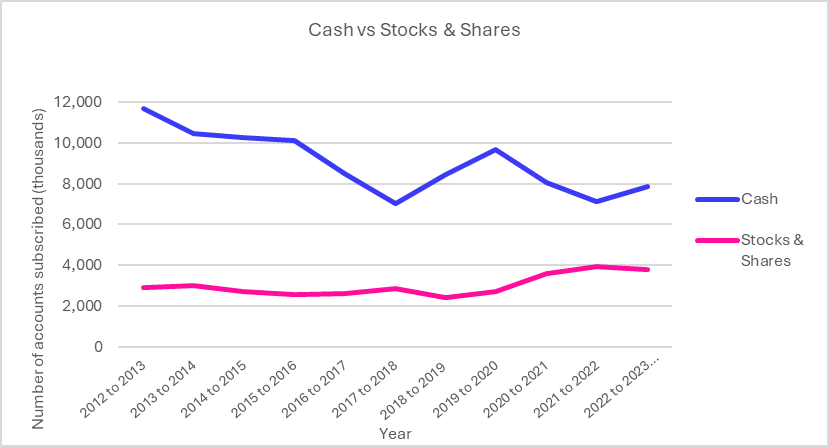Are cash ISAs falling out of favour?
Cash ISA openings are trailing those of stocks and shares ISAs, new research shows, suggesting investors are front-running potential government reform


Get the latest financial news, insights and expert analysis from our award-winning MoneyWeek team, to help you understand what really matters when it comes to your finances.
You are now subscribed
Your newsletter sign-up was successful
Want to add more newsletters?

Twice daily
MoneyWeek
Get the latest financial news, insights and expert analysis from our award-winning MoneyWeek team, to help you understand what really matters when it comes to your finances.

Four times a week
Look After My Bills
Sign up to our free money-saving newsletter, filled with the latest news and expert advice to help you find the best tips and deals for managing your bills. Start saving today!
Cash ISA reforms are in the government’s sights as it looks for ways to reinvigorate the UK’s private markets. New research suggests, though, that people might be moving away from cash ISAs of their own accord.
Different kinds of ISA can be used for different purposes. Cash ISAs and stocks and shares ISAs are two of the most popular. A cash ISA is effectively a savings account that offers tax-free interest, while a stocks and shares ISA allows you to invest in funds, stocks and trusts.
While no direct mention of cash ISAs was made in chancellor Rachel Reeves’ Spring Statement last week, documentation following the event confirmed that ISA reform is under consideration and that the cash ISA threat remains.
MoneyWeek
Subscribe to MoneyWeek today and get your first six magazine issues absolutely FREE

Sign up to Money Morning
Don't miss the latest investment and personal finances news, market analysis, plus money-saving tips with our free twice-daily newsletter
Don't miss the latest investment and personal finances news, market analysis, plus money-saving tips with our free twice-daily newsletter
“Despite holding off on reform today, the government has confirmed change to the status quo is being considered ahead of the Budget later this year,” said Michael Summersgill, CEO of AJ Bell, following the chancellor’s statement, “with Labour having already committed to ISA simplification and encouraging greater use of stocks and shares ISAs during the general election campaign.”
The speculation is that the government will reduce the annual ISA limit specifically for cash ISAs, perhaps to as low as £4,000 per year, in order to encourage more people to invest in the stock market via a stocks and shares ISA.
“The government wants to get more people into investing, helping them increase their wealth while supporting wider economic growth.” says Andrew Prosser, head of investments at investment platform InvestEngine.
Cash ISA growth is falling: stocks and shares are on the rise
Government intervention might not be needed, though. New research from InvestEngine has found that new cash ISA openings are declining while stocks and shares ISAs are on the up, and that the amount invested in the latter is substantially higher than the amount held in cash ISAs.
New stocks and shares ISA openings have increased 57% in the five years from 2018/19 to 2022/23, the most recent year for which data is available, according to InvestEngine’s analysis of HMRC data.
Conversely, new cash ISA openings fell by 7% during that period.

Chart shows the number of cash and stocks and shares ISAs opened from the 2012/13 tax year to 2022/23.
More funds are held in stocks and shares ISAs compared to their cash counterparts. The amount of funds held in stocks and shares ISAs increased 37% over this five year period to £431 billion, while cash ISA holdings have increased just 9% to £294 billion – meaning stocks and shares ISAs hold 46% more than cash ISAs.
Type | 2018 to 2019 | 2022 to 2023 (£ million) | % change |
|---|---|---|---|
Stocks and Shares ISAs | 314,031 | 430,775 | +37% |
Cash ISAs | 269,649 | 294,329 | +9% |
Source: HMRC Annual savings statistics 2024 via InvestEngine
“Although reforms have been delayed, our analysis shows stocks and shares ISAs are in fact increasing in popularity without the explicit need to make cash ISAs less appealing,” says Prosser.
Cash ISAs vs stocks and shares: which is better?
The debate over cash ISAs versus stocks and shares ISAs has been going on for some time, and with the end of the tax year approaching fast, savers and investors will be wondering where best to put their money.
In truth, it’s not an either/or situation. Both types of ISA offer particular benefits, and have a role to play in building long-term wealth and financial security.
Cash ISAs offer relatively easy access to your money whenever you need it. As such, they’re a good place to save for essential spending. How much you should have in savings varies depending on your particular circumstances, but as a rule of thumb many experts recommend having enough saved to cover three to six months’ essential spending.
It’s worth considering allocating any further cash above this to a stocks and shares ISA, though. Funds held in a cash ISA tend to perform poorly compared to the stock market over time, and can often fail to keep up with inflation.
“Past performance shows investment beats interest in the long-term,” says Prosser. “The government should use this period to improve public understanding of how investing, especially through diversified, simple and low-cost products like ETFs, could help more people to achieve their financial goals.”
While you don’t want your emergency savings to be invested in stocks and shares (in case you need them while the stock market is enduring a downturn), this is often the best way to build your longer term wealth.
Given high levels of current inflation, which many rates on offer from retail banks fail to match, "it makes sense for long term investors to favour investing over saving, even if it’s in simple index trackers”, says Dzmitry Lipski, head of funds research at Interactive Investor.
“As we move into a more uncertain market environment, it makes sense for cautious investors – or someone approaching retirement – to focus on capital preservation and limit volatility by maintaining a reasonable cash buffer within a well-diversified portfolio.”
In terms of InvestEngine’s research, the period in question was a notably poor time to invest in cash given it coincided with historically low interest rates and a boom period for the stock market.
That said, the stock market downturn at the end of the period might have prompted a bigger turnaround in momentum than was in fact the case.
“Despite historically low interest rates during the pandemic having come to an end, the number of cash accounts being opened hasn’t bounced back,” says Prosser.
Get the latest financial news, insights and expert analysis from our award-winning MoneyWeek team, to help you understand what really matters when it comes to your finances.

Dan is a financial journalist who, prior to joining MoneyWeek, spent five years writing for OPTO, an investment magazine focused on growth and technology stocks, ETFs and thematic investing.
Before becoming a writer, Dan spent six years working in talent acquisition in the tech sector, including for credit scoring start-up ClearScore where he first developed an interest in personal finance.
Dan studied Social Anthropology and Management at Sidney Sussex College and the Judge Business School, Cambridge University. Outside finance, he also enjoys travel writing, and has edited two published travel books.
-
 Should you buy an active ETF?
Should you buy an active ETF?ETFs are often mischaracterised as passive products, but they can be a convenient way to add active management to your portfolio
-
 Power up your pension before 5 April – easy ways to save before the tax year end
Power up your pension before 5 April – easy ways to save before the tax year endWith the end of the tax year looming, pension savers currently have a window to review and maximise what’s going into their retirement funds – we look at how